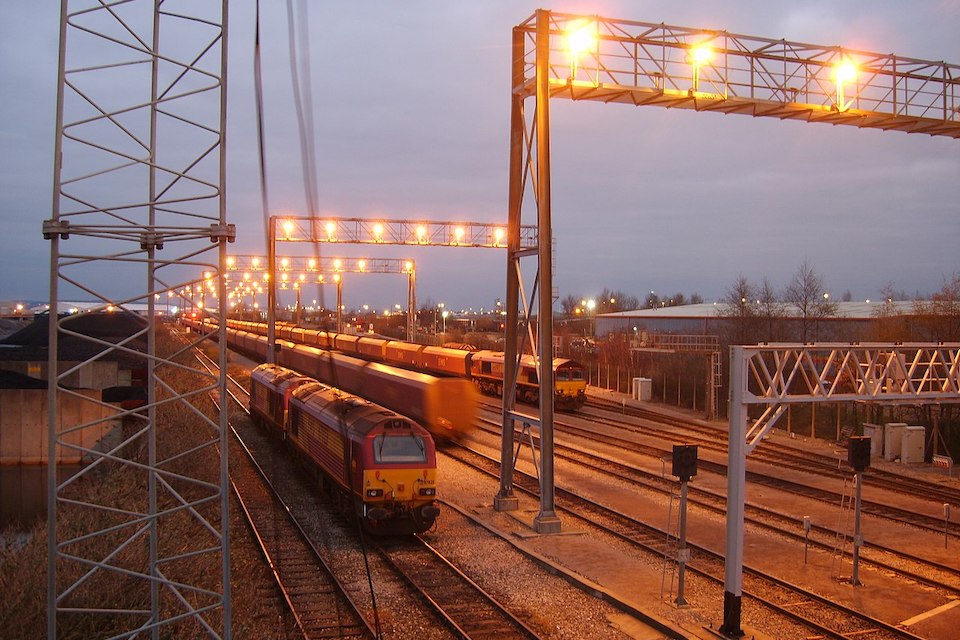Delivering CO2 into a modest UK port could mean big gains for rail freight. A new study is examining the prospects for turning Bristol’s Avonmouth Docks into a hub for shipping and carbon capture. Now, a UK engineering consultancy is assessing the land side potential of the multi-billion pound proposals. The project could rely on existing rail infrastructure to make the scheme financially viable. The docks are already connected to the railway network for existing bulk and intermodal traffic.
Avonmouth may not be the biggest dock facility on the global scale. However, the West of England port could become a world leader in carbon capture. Revitalised shipping importance could be thrown in for good measure. The docks are at the heart of a project that, if realised in full, is estimated to bring a multi-billion pound investment to the region. Rail freight is proposed to play a large part in handling raw and processed materials.
Economical use of existing rail infrastructure
Apollo, an engineering and energy advisory consultancy headquartered in Aberdeen, Scotland, is assessing the potential for a massive carbon capture and shipping hub, centred on Avonmouth near Bristol. Apollo has been selected to conduct three critical studies for a project, under the banner of “7CO2 Carbon Capture and Shipping Hub”. The initiative aims to facilitate local and regional decarbonisation across the Southwest of England, the English Midlands, and West Wales, attracting up to GBP£1.3 billion of inward investment to the Bristol region and over £4 billion to the broader area (around €4.7 billion).

The project relies on the economical use of already installed infrastructure, including rail freight, to deliver captured CO2 to the site. “The rail study is focused on utilising the existing freight rail network to transport liquified CO2 from dispersed emitters to a central facility,” explained Calum Westland, Senior Consultant with Apollo. “Dispersed emitters will capture their CO2 emissions using carbon capture technology before it is processed for transportation to the hub,” explained Calum Westland, before it is purified and liquified. Once processed, it will be loaded onto cryogenic storage vessels for onward transportation to the 7CO2 hub in Avonmouth. Utilising this form of non-pipeline transport (NPT) for CO2 allows these emitters to decarbonise by providing a route to storing their carbon emissions.”
Clean power from carbon delivered by rail
The 7CO2 hub, which will be located with the existing Avonmouth Docks, will provide a pathway for the permanent storage of post-combustion captured CO2. This is in line with the UK Government’s climate goals and, as such, it has attracted grant funding from the UK Innovate Local Industrial Decarbonisation Plan (LIDP). Apollo’s studies will focus on rail, land, and power options, contributing to the comprehensive West of England LIDP report. Rail freight industry stakeholders in the 7CO2 project include GB Railfreight, multinational rolling stock leasing corporation VTG, and the forthcoming infrastructure management agency, Great British Railways.

Marine emissions are a major environmental concern around the world. The idea at 7CO2 is to turn that climate liability into a capital gain, by making carbon capture a revenue stream. Apollo is studying the details of making that possible, by looking at the feasibility of transporting CO2 by rail from regional emitters; evaluating land for industrial decarbonisation projects, such as clean power, hydrogen production, and Sustainable Aviation Fuel (SAF) production; and exploring cost-effective power supply options, such as renewable generation and small modular nuclear reactors. Avonmouth already has green credentials, with freight trains delivering household waste from London for energy production to a nearby site.